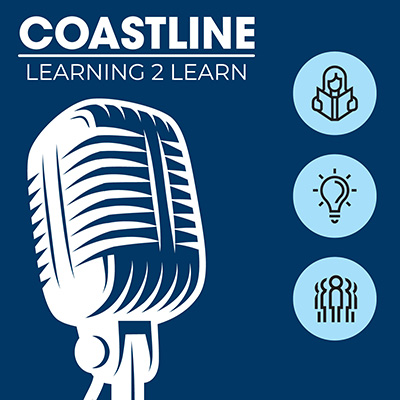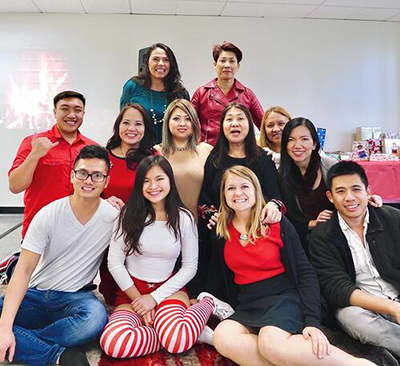In episode two of Coastline’s limited series podcast, we explore the concept of balance with someone who experienced college as unfamiliar terrain.

Learning to Learn is in its second week, which means episode two is out now and ready for your ears! Seriously though, it's a good one, with lots of interesting ideas, an excellent interview, and a potentially brand-new way to consider time management and the life-work balance conundrum. But let’s take a step back, in case you missed the first episode as well as the accompanying blog all about it last week.
What is Learning to Learn?
It’s a podcast! And not just any podcast; it’s formed in the crucible of Student Success Coordinator and Associate Professor Danny Pittaway’s knowledge, our guests’ wisdom, and my good humor (if it can be so-called). It explores learning from multiple perspectives, all in order to help students, professors, and life-long learners better understand how to approach education, in or out of the classroom.

Where Can I Find It?
Everywhere! Well, not everywhere. As far as I know, if you went to the top of the Eiffel Tower you would not find our Learning to Learn podcast. But maybe you’d find a sweetheart or at least a great view, which is cool too. In any case, L2L is available on all major podcast platforms, including Apple and Spotify. Follow, Subscribe, Download, Listen, Enjoy. It’s that simple.
So What Is This about a Conundrum of Life-Work Balance?
That’s the subject of episode two of L2L. It’s an exploration of the often frustrating juggling act students and people do in order to find balance in our lives with all our many obligations and commitments. If that sounds at all like you, then I recommend giving it a listen.
People, but students especially, are asked to juggle a lot: work, family obligations, social obligations, assignments, projects, a sense of individual responsibility, etc. The list could go on forever. We end up becoming even more frustrated when we can’t find the life-work balance we’re seeking. We look around and wonder whether finding it’s even possible.
Check out L2L On Coastline's YouTube Channel
Who Did You Interview?
Good question. For this episode, Danny and I wanted a different perspective from that of a teacher. We wanted someone who’s lived this conundrum day in and day out even beyond that of a normal college student. Natalie Tran, who we’ve featured on the blog before, was the perfect candidate. Natalie is a first-generation college graduate (congrats Natalie!) whose career aspiration is to help struggling students.
When she first arrived at Coastline, she was overwhelmed. And let’s face it. College is overwhelming, but especially to someone with no familial familiarity with the experience at all. She found and nurtured a support network, a group of peers, faculty, and staff that could mentor and guide her. These advisors could also help provide balance in what Natalie called her ‘wheel or circle of support.’

So What Was Natalie’s Advice?
Natalie’s biggest piece of advice was indeed to find that support network. Find the group or groups that can help you locate even just a modicum of balance. Maybe it’s a tutor who can help with your math homework. Maybe it’s a professor who is easy to talk to. Maybe it’s both. She also admitted to not having achieved her ideal sense of balance yet. She acknowledged that finding it may be a lifetime pursuit, but it wasn’t one she was anxious about.
In essence, the broader lesson that Danny and I came away with (after listening to Natalie’s wise words) was to spend less time worrying about finding balance. We also found that everyone’s definition of balance looks different. We’re different people with various priorities and goals. Finding your own sense of balance, or imbalance, will pay off more than settling for someone else’s definition.
Coastline's Student Success Resource Center
If you acknowledge your lack of balance and find that you’re okay with it, if you find the imbalance exists for a good reason—like an artistic passion that takes up a lot of your time or people you love hanging out with—then the imbalance becomes more bearable. The reason doesn’t even have to be good enough for anyone else. Just for you. And then you can move forward knowing it’s okay you haven’t managed a life-work balance; you’re looking for your own.
So Now What?
Now, a bonus preview of episode three of Learning to Learn which is out now! Take a listen to this preview. The title and subject of the episode is Adaptability. First, I set the mood; next, Danny and I break down our initial thoughts on what being adaptable means. In the context of a classroom or setting goals, it means flexibility, but it can also mean steadfastness. As in, you can adapt not changing course as well.
Then, I speak with Coastline’s Esports experts Katherine Amoukhteh and Stephanie Bridges about being adaptable in the context of gaming. They each had stupendous points about transferrable skills and the common misperceptions of what gamers are like that are very much worth listening to.

Wrappin' It Up
As I said in last week’s blog, let’s make this short and sweet. Episode two offers great insight into the balancing act we all do. Beyond that, Natalie is reassuring and uplifting and gives a great shoutout to all the students of the pandemic. The episode is worth it for that alone and you’re not going to want to miss it. Nor will you want to miss episode three. That’s why you should (say it with me!) Follow, Subscribe, Download, Listen, Enjoy! Simplicity, thy name is Learning to Learn.